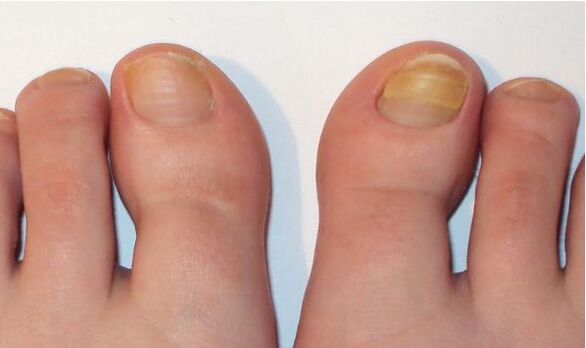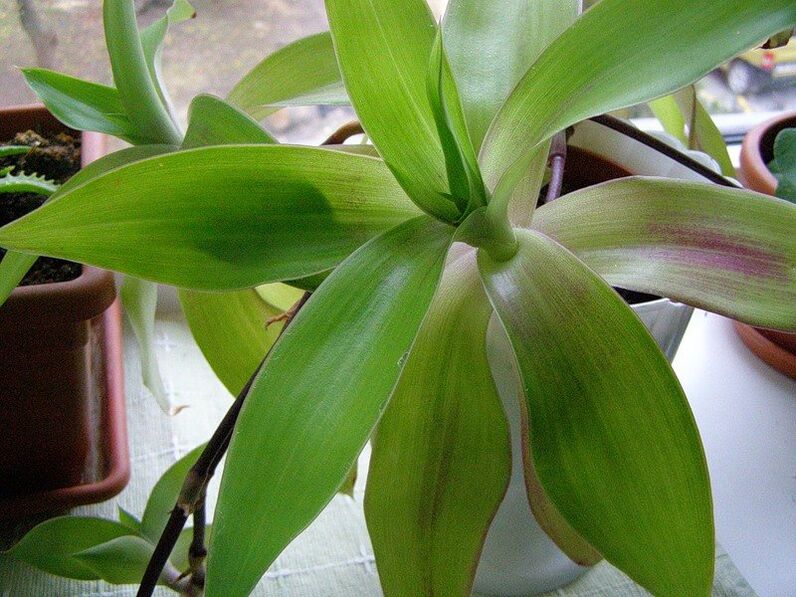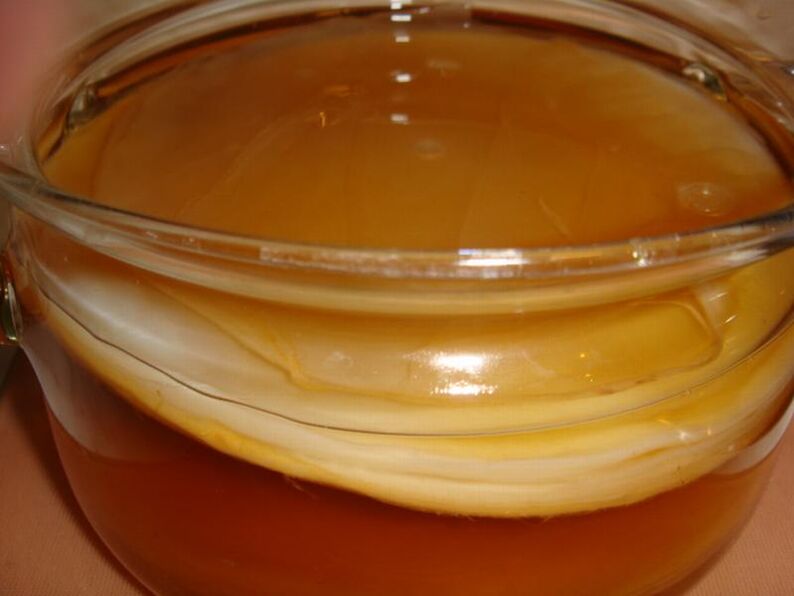Toenail fungus (onychomycosis) is a mass disease that spreads easily in unsanitary conditions, public places and can also occur from excessive sweating of the feet as a result of wearing poor quality shoes. If the rules of personal and general hygiene are not followed, onychomycosis quickly affects the toenails, and then it is necessary to undergo long and expensive treatments, which do not always guarantee complete relief from the disease.

How to recognize a fungus
Sometimes a person does not give importance to the fact that the nail has changed color, structure, has become brittle or vice versa, thick and hard. Also, the primary symptoms of onychomycosis are not obvious, although it is at this stage that treatment can still help to quickly resolve the problem.
Treatment should begin immediately if the following symptoms are detected:
- the appearance on the nails of imperceptible stripes, dots or whitish spots;
- loss of the nail's natural shine and formation of cloudy, whitish or brownish areas;
- delamination of the nail plate;
- inflammation of the skin adjacent to diseased nails.
The characteristic signs of onychomycosis are itching, burning, dryness and scaling. If at least two or three of these signs are found, it indicates that it is time to start treatment.
Effective traditional medicine
For the treatment of nail fungus, various means are used - from medicines sold over the counter in pharmacies and chemical products to medicinal plants. You often have to try different methods or combine several of them to get a positive result. The main thing with this treatment is not to stop and bring the course to an end, as untreated onychomycosis tends to manifest itself in the form of relapses and lead to the defeat of new, healthy nails.
Medicines and remedies available
Some improvised means that are available in a closet or first-aid kit in every apartment are effective antifungal drugs. These remedies include ordinary iodine, with constant rubbing on the affected nail, you can quickly get a complete cure for the disease, but only in the early stages of onychomycosis.
The standard course of treatment with the use of iodine involves the daily use of a 5% solution, which should be rubbed into the nail twice a day (in the morning and before bed) for a month. After a few weeks of treatment, you may feel pain in the skin around the diseased nail, but this is not a chemical burn, but a sign of the healing process starting.
An alternative to iodine is a strong solution of potassium permanganate. This remedy, diluted in water in a 1: 1 ratio, is also rubbed into the diseased nail with the same frequency, and after the first week you can see changes for the better.
Hydrogen peroxide is considered a more benign agent: cotton pads soaked in this agent should be applied to painful nails so that these compresses can be easily secured with a sock. It is necessary to change discs twice a day as long as you are constantly wearing shoes (eg at work). This will smooth the affected nails, after which the diseased segments and areas will be easily removed.
Popular antifungal medications among people are soda and propolis, which can be used in many ways.
- Soda. Baking soda is added to a bowl of hot water at the rate of one tablespoon per three liters of boiling water. After cooking the legs in such a liquid for thirty minutes, the nails affected by onychomycosis should be lubricated with celandine essential oil, after drying the feet. It is applied until complete recovery.
- Propolis. 10 grams of propolis are added to one hundred grams of alcohol, the product should be placed as firmly as possible under the affected nails after steaming. The tool can also be applied to the surface of the diseased nail, after which a sock is placed on the leg or a tight bandage is applied. You can change this dressing only after a day. Used until complete cure of onychomycosis.
- 20% alcoholic propolis solution. The affected areas of the nail are lubricated daily with the product. Applied for two weeks.
These funds usually give results within 7-10 days of starting the course. If these methods don't work, you'll need to try other recipes.
herbal treatment
Herbs are the safest natural ingredient that, in certain recipes, helps to quickly cure onychomycosis. Most often, a golden mustache is used as a natural remedy. It is necessary to cut about 50 segments of the plant and insist on 500 ml of vodka. A week later, the finished infusion is diluted with water in a ratio of 1: 3 and applied to the diseased nail two or three times a day every day until the fungus is completely eliminated.

Ordinary lilac flowers are also antifungal if properly prepared. Just pour 10 grams of freshly picked flowers of this plant with one hundred grams of pure alcohol and leave to infuse for two weeks - and the product is ready. It must be applied in the same way as the previous one.
An interesting method that does not involve external use, but internal use. To prepare such a remedy, you need to take ten grams of the following plants:
- blackberry leaves;
- oak bark;
- field horsetail;
- marigold flowers;
- verbena.
A mixture of these herbs is poured with a glass of boiling water and boiled over a fire for fifteen minutes. The remedy is taken 4 times a day, one tablespoon.
Other folk remedies
For treatment, you can use birch tar, which can now be purchased at any pharmacy. This tool is used as follows:
- In the evening, the legs are well steamed and rubbed with washing powder for 15-20 minutes.
- Softened nails should be trimmed, paying particular attention to removing diseased exfoliated areas.
- Nails are thickly smeared with birch tar, which should be left for an hour and a half to two hours.
- After this period, the feet can be cleaned of tar and washed carefully, the procedure is repeated once a week until the nails heal.
Kombucha is effective against onychomycosis. This tool is used for compresses: a tight bandage, gauze or a piece of cloth is soaked in kombucha, which are superimposed on a painful nail.
To prepare kombucha, you will need three liters of tea and one and a half cups of sugar. Tea should be poured into a three-liter pitcher and left in a warm place for several days: during this time, a film forms on the surface of the liquid, which looks like ordinary mold. At this point, sugar is added to the pot, which speeds up the kombucha's growth process. It usually doesn't take more than a month and a half to mature.

The entire foot is then rewound with polyethylene: this is an additional factor that deprives the fungus of access to oxygen, which accelerates the process of exterminating the parasite. Warm socks are placed over the polyethylene so that you can go to bed, removing the compress in the morning. The procedure is repeated daily until complete recovery.
If the previous methods don't work, you can try using essential oils. In fact, these cheap drugs are almost exact analogues of expensive antifungal drugs; therefore, in terms of properties and efficacy, essential drugs are close to any drugstore antimycotic.
The advantage of essential oils is that they act in a complex way, providing an antibacterial, anti-inflammatory, purifying and regenerating effect, so that recovery is quick and painless. Unlike many antifungal creams and gels, which completely destroy the affected nail plate, essential oils cleanse diseased areas.
You can use these products in different ways, for the preparation of the product, the entire container with essential oil is used completely:
- As a compress: the essential oil must be heated to a temperature of 30 degrees in a water bath, then add two tablespoons of water to dilute the viscosity. Tampons or cloths are soaked in this oil, which are attached to the diseased nail for no more than an hour. After removing the compress, you can see that the affected part of the nail has peeled off, but its main clean part remains (later it will be covered with a new protective layer).
- For baths: three liters of hot water are poured into a basin and ten drops of essential oil are added. Just hold the legs in a basin for 20-30 minutes, after which they need to be dried and wrapped with a thick towel for a while.
- As an ointment: the essential oil is applied in any amount to pre-steamed diseased nails. Afterwards, the oil does not need to be removed; it is necessary to apply an amount that is completely absorbed into the nail plate (this is revealed empirically).
You can use absolutely any essential oil to your liking:
- tea tree oil;
- ylang-ylang;
- rosemary oil;
- anise oil;
- bitter orange oil;
- basil oil;
- bergamot oil;
- immortal oil;
- vetiver oil and any others.
The only contraindication in this case may be an allergy to the components of a certain type of oil.
Such recipes are used until full recovery.
The fungus is a dangerous and common disease that requires immediate treatment. In the absence of adequate measures, this disease can develop into a chronic form, which is sometimes absolutely impossible to get rid of. Experts often recommend abandoning the use of folk remedies, but according to statistics, onychomycosis is most often cured with the help of traditional medicine, but in order to have a positive effect, you need to choose the right recipe for you.
























